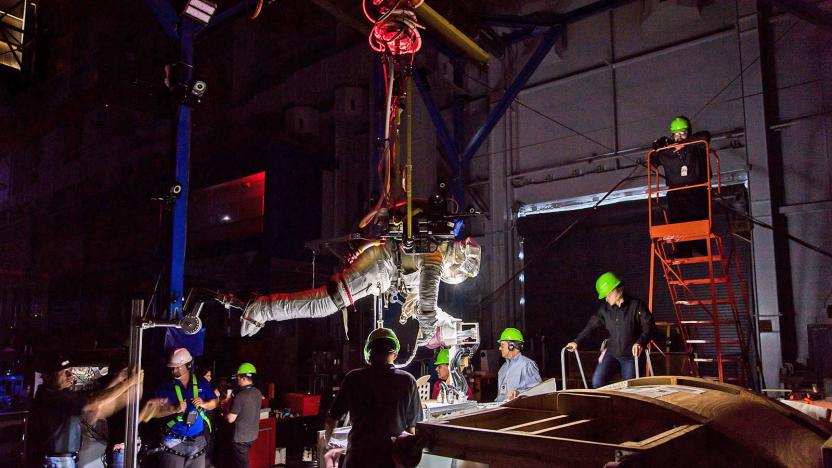JohnsonSpaceCenter
Latest

Learning to fly with NASA's spacewalk simulator
What you're looking at is not a production set photo from Gravity, but rather a training simulation for Canadian Space Agency astronaut Jeremy Hansen. He's suspended over a mockup of the International Space Station (ISS), while attached to the Active Response Gravity Offload System (ARGOS) at NASA's Johnson Space Center in Houston, Texas. For this particular session, engineers ran tests in both light and darkness to simulate the 90 minute day/night cycles experienced by orbiting astronauts.

NASA demos incredibly agile, remote-controlled EV
When we talk about the cars of the future, we're normally bandying around names like Google and Tesla. NASA's engineers at the Johnson Space Center might have just trumped those other names after unveiling its new Modular Robotic Vehicle prototype. While it may look like the world's dullest golf cart, the MRV is actually a futuristic EV that could serve as the test bed for future rovers, amongst other things.

NASA's humanoid Valkyrie robot could lead the way to Mars (video)
NASA's Robonaut is only just getting its legs, but it already has some fresh (and arguably superior) competition. The agency's Johnson Space Center has given IEEE Spectrum a sneak peek at Valkyrie, a DARPA Robotics Challenge entry built to take on dangerous tasks that would normally require a human presence. In addition to sporting more joints than many of its typical two-legged rivals, the sometimes autonomous machine is chock-full of cameras, LIDAR and sonar that help it quickly move around. It can operate under planetary gravity loads that Robonaut can't touch, and even an inexperienced user can keep it running; the modular design lets astronauts swap out batteries and replacement limbs within minutes. Valkyrie isn't guaranteed to enter service, as it will have to win the support of both DARPA and NASA officials before it progresses much further. If it passes muster, however, it could be vital to NASA's long-term plans for Mars -- robots such as Valkyrie will likely prepare any future Martian landing site and assist humans once they arrive.

Artificial Space Shuttle Explorer readies for launch at sea, journey to Houston
Were you asleep at mission control during Endeavor's final flight? Did you forget to look to the New York City skyline for the Enterprise's last adventure? Buck up buttercup, there's still one Space Shuttle launch you haven't missed -- a faux Space Shuttle, named Explorer, is prepping itself to ride a barge to NASA's Johnson Space Center in Houston. The full-size shuttle mockup was shuffled out of the Kennedy Space Center Complex to make way for an actual spacecraft last year, and will now embark on a ten day journey by sea to its new home in Texas. "NASA's Space Shuttle changed the way we think about space, making it more accessible, understandable and useful," stated Space Center Houston President, Richard Allen. "It is our intent to continue that legacy with this exciting new attraction." The replica shuttle will be getting a few upgrades, including a new cockpit that more closely resembles the interior of space shuttle Atlantis, and will be housed in a new education facility that is being built around the mock spacecraft. Sure, it's not as exciting as a legitimate shuttle launch, but we're still happy to give the old bird one final send off.

NASA's shuttle PCs sold with sensitive data intact, insert WikiLeaks joke here
Let this be a warning for John and Jane Q. Public (always a cute couple, those two) to always wipe sensitive / secret data from your hard drives before selling a computer. Or better yet, take out the drive entirely and physically destroy it. That's what we'd expect from our government entities, but an internal investigation found that a number of PCs and components from NASA's shuttles had been sold from four different centers -- Kennedy and Johnson Space Centers, and Ames and Langley Research Centers -- that "failed sanitization verification testing," or weren't even tested at all. In Langley's case, while hard drives were being destroyed, "personnel did not properly account for or track the removed hard drives during the destruction process." Meanwhile at Kennedy, computers were found being prepped for sale that still had "Internet Protocol information [that] was prominently displayed." Helluva way to start a shuttle launch retirement, eh?



